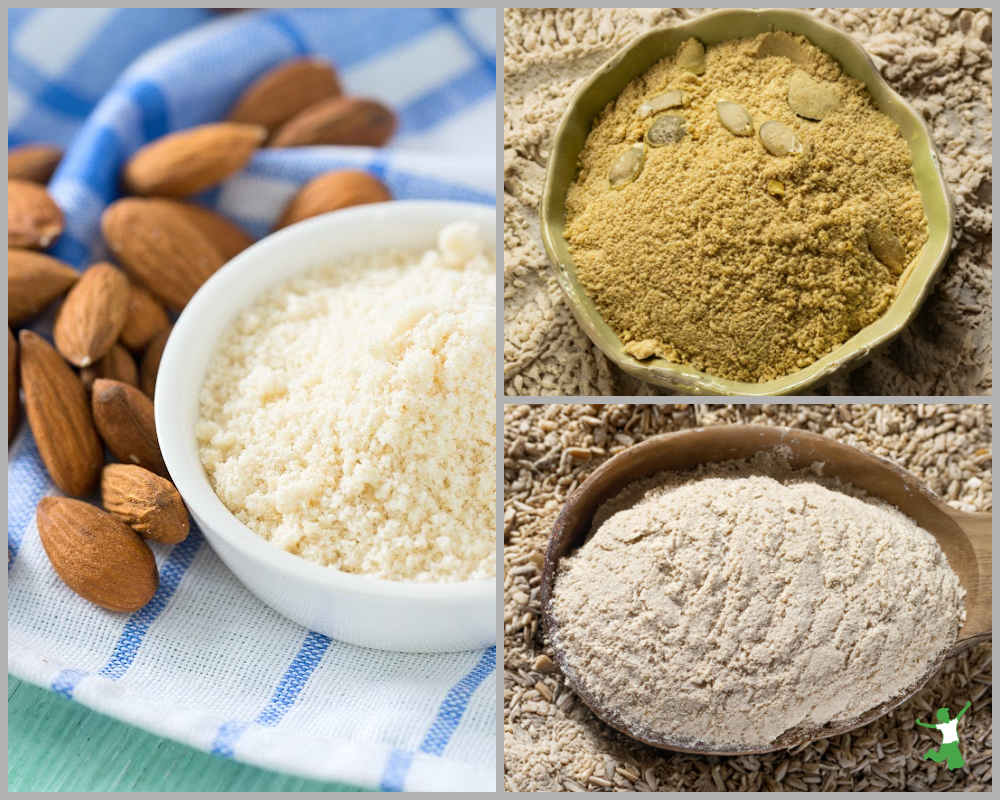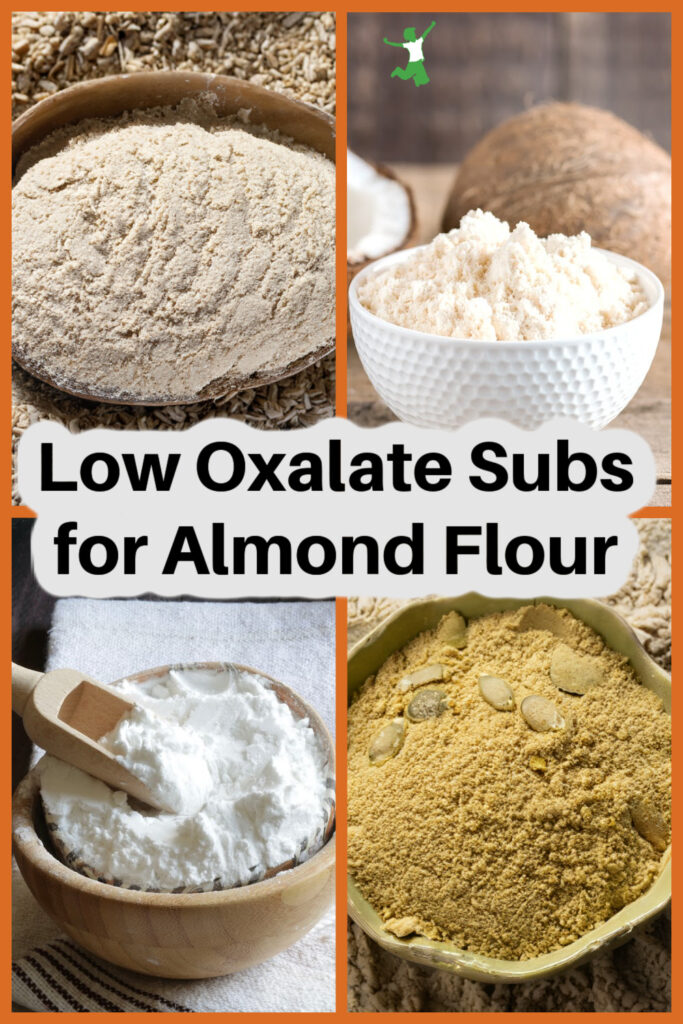Table of contents[Hide][Show]
Low-oxalate alternatives to almond flour and other types of nut flours for keto or grain-free baking and cooking needs.

My post in the weekly newsletter about grain-free blueberry pecan cobbler food sparked a slew of questions about a low-oxalate alternative to the nut flour portion of the recipe.
Why do some people avoid foods high in oxalates?
Due to problems with the accumulation of oxalate crystals in body tissues, more people than ever are following a low oxalate diet.
Chronic problems with kidney stones are a typical symptom.
About 10% of the population is genetically predisposed to damage from a high-oxalate diet.
In addition, people with excessive fungal (Candida) infestation in their gut are also at risk from foods high in oxalate.
This is due to certain beneficial strains of gut flora, particularly species of this genus Oxalobacterbreak down oxalates for us!
These anti-oxalate microbial strains are being decimated by antibiotics and possibly dozens of other drugs.
When these strains are absent in an imbalanced gut, dietary oxalates can cause symptoms.
Keto diets and excessive oxalates
To make matters worse, many people who are sensitive to oxalates also eat grain-free diets with little to no starch to lose weight and/or heal the gut.
For example, the GAPS diet, the Candida diet, and the specific carbohydrate diet prohibit grains and starches as part of the healing protocol.
Many keto dieters have to find this out the hard way.
They forgo grain and starchy carbs and substitute higher-oxalate foods like almond flour, only to experience a kidney stone attack or more severe symptoms like vulvodynia within months.
Since almond flour is perhaps the most popular grain-free option for cooking and baking, I’d like to say a few words about the best alternatives if you’re sensitive to oxalate and need to reduce exposure.
Low Oxalate Nut Flour?
Unfortunately, the term “low oxalate nuts” is a contradiction in terms.
While there are nuts that are lower in oxalate than others, I’ve yet to come across any truly “low oxalate nuts.”
For example, pecans, walnuts, and macadamia nuts may have the lowest oxalate levels at 10 mg, 8 mg, and 12 mg per ounce, respectively.
In fact, to be considered “low in oxalate,” a food must contain less than 10 mg per serving.
So even nuts that have the lowest oxalate content are borderline too high.
starches
When it comes to avoiding high-oxalate nut flours, especially almond flour, which has the highest oxalate content, potato starch or flour are the best choices.
However, avoid cassava flour (tapioca flour) and arrowroot flour, both of which are on the high end in terms of oxalates.
Since potato flour is very starchy, it would not be an acceptable choice for those following a low-carb weight loss diet or a gut-healing diet like GAPS.
However, for those who can tolerate a starch-based alternative to almond flour, potato flour is the best low-oxalate option.
fruit flours
Another good alternative to nut flours like almonds is coconut, which is considered a fruit flour because it’s derived from stone fruits.
However, watch out for other foods like green banana flour and plantains, which contain significantly more oxalate.
The downside of coconut flour is that it cannot be substituted 1:1 in recipes that call for almond flour.
Only small amounts of coconut flour are suitable for a recipe.
Therefore, another flour usually has to be mixed with coconut flour to achieve the right texture. Another option is to use one of the flours listed below alone instead of the almond flour.
Below we will discuss my favorite options for this purpose.
seed meals
By far my best recommendation for low-oxalate alternatives to almond flour is kernel flour.
Specifically, sunflower seed flour is my personal favorite, followed by pumpkin seed flour.
However, avoid flaxseed meal or meal as these are unfortunately a very popular low-oxalate diet.
This is because, second to soy, flaxseed is very high in estrogen. Regular consumption of flax can also lead to breast cancer precursors if consumed frequently, in addition to other hormonal problems.
I personally never put any flax on the menu. Our world is so polluted with pseudoestrogens anyway.
Even if you live very cleanly and eat quality foods, you are likely exposed to its effects. Therefore, in my opinion, there is only one downside to adding flax to your diet.
Sunflower seed flour is ideal because you can replace it 1:1 with almond flour in your recipes.
Note that you will have to make it yourself as commercial versions are likely to be outdated and/or rancid.
The good news is that it is very easy to prepare.
I recommend buying sprouted sunflower seeds (that’s the brand I use) and grinding them into fresh flour in a coffee grinder.
Alternatively, you can soak shelled sunflower seeds overnight, drain, dry in a warm oven (or food dryer), then grind into flour. This method is a bit more time consuming, but cheaper.
baking tips
Grain mills are not well suited for grinding seed flours due to the oiliness. So it’s a good idea to invest in an inexpensive coffee grinder for this task.
If you’re cooking for a large household, prepare large batches and then freeze them for quick use later!
Frozen seed meal can be used in recipes straight from the freezer with no thawing required.
Diploma
While foods higher in oxalate are not unhealthy and have been routinely incorporated into traditional diets around the world, some people in our modern times have had to forgo them, at least temporarily.
This is due to the need to restore the gut to a more diverse and favorable microbial balance.
During this time, it’s best to avoid grains and almond and other nut flours high in oxalate.
The most practical 1:1 substitute in recipes that are also grain and starch free is sunflower seed flour followed by pumpkin seed flour (a bit more difficult to grind into a fine flour).
Potato starch or flour is also an option for those who can tolerate starch and are not tied to a gut healing protocol.
Additionally, coconut flour is an option, but due to texture issues, only small amounts are suitable for baking.
For the best digestive and nutritional experience, I recommend grinding sunflower or pumpkin seed flour from sprouted or soaked seeds.

references
(1) Low oxalate nuts and seeds
(2) Best Almond Flour Substitutes
(3) Oxalates in a gluten-free diet

